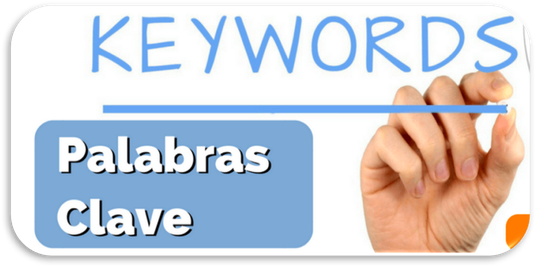Author: Rosa García-Ruiz – Translation: Erika-Lucia Gonzalez-Carrion
The key words form, together with the title and the abstract the metadata of an article, and constitute therefore the “Presentation card” of a scientific publication.

The author of a scientific article should aggravate his or her senses and research competences to get right to the time to select the terms that best describe the themes of their work and over all, the particularity of its contribution. In this sense, the selection of key words should be done in a reflexive and deliberated way, by thinking in the reader of the work, because they define the content of the article. This aspect is rather important if we want that our article could be found by other researchers in our knowledge area, because in this way we ensure its diffusions and of course, its impact in the scientific community.
At the same time, key words constitute a search tool of scientific works that all investigators should know how to manage in order to find in an effective way the works related with the terms that have been used to define a consistent theoretical framework in their works.
Then, the key words have a double function in scientific research, describe the main characteristics of an article, increasing their diffusion and, on the other hand, allow the search and selection of the works that interest us the most among the magnitude of the existent scientific publications.
In order to decide which key words are the most appropriate for our article many journals recommend its selection between the offered by a dictionary, because it is about a list or system of organization of scientific terms that standardize the knowledge and allows the indexation and recuperation of information in catalogues and data basis, facilitating to researchers to make effective bibliographical researches. There are different dictionaries, linked to different scientific fields, and with different relations among their terms (semantics, hierarchies, etc.) In the field of Social Sciences, the most known dictionary and the most recommended for the scientific journals to their authors for them to select among their purposes those terms that they want to reflect in their article is the one of UNESCO, which offers a controlled and structured list of terms for the thematic analysis and the search of documents and publications in the fields of education, culture and natural sciences, social and human sciences, communication and information. It is a wide and updated list, allowed in the digital version in four languages that reflect the evolution of the programs and activities of this organization http://vocabularies.unesco.org/browser/thesaurus/es/
The majority of the journals of social sciences ask for the inclusion of 3 to 8 key words in each article, and therefore the editorial counsel, and the reviewers give special attention to the selected words, because they will be the ones that facilitate the reading of more or less researchers, in function of their quality and accuracy. Comunicar Journal indicates in its regulation that there should be included 8 key words or descriptors in its article, reason why it is recommended to use those words that interest us the most among the selected in articles previously published.
To end with this post, it is convenient to remember that once our article is published, the key words also have an important role in the diffusion through the main scientific networks, to which we made reference previously Academia.edu in which section “Research Interests” and ResearchaGate in the part of “Topics”, they offer a list of terms that we can select, coincide or not with the key words of our article, trying to look for the biggest possible impact.
The School of Authors of Comunicar insist on the importance of the key words that we select in each article, given that they identify us as researchers, present our interests and define the quality and coherence of our research trajectory.
